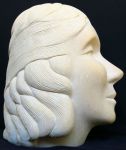

Penelope the Weaver - 2013Penelope was the wife of Ulysses who waited many years for him to return from fighting in foreign wars. During this time she fended off unwelcome marriage proposals by pretending to be weaving a burial shroud for her husband's elderly father and claiming that she will choose a suitor when she has finished. By day she could be seen dutifully weaving the shroud, but every night she secretly undid her days' work, thus ensuring that she would never be finished. Because of her faithfulness, Penelope is often seen as a symbol of marital fidelity.
Her name, Pēnelope, is usually understood to combine the Greek words for 'weft' and 'face' a combination perhaps derived from her reputation as a secretive weaver who was able to fool her suitors for so many years.
This sculpture is carved from Caen Stone, a light creamy-yellow fine-grained limestone that was formed in shallow water lagoons about 167 million years ago. Also known as Pierre de Caen, today it is quarried in northwest France near the city of Caen. It was a popular building material with the Normans in England, and was used in both the cathedral and castle at Norwich where it was brought by boat up the River Wensum. It was also used in Canterbury cathedral and at Reading Abbey. Perhaps the most famous building in Caen stone built in Norman times is the Tower of London.
The sculpture weighs 50.7 lbs, and measures 13" high x 9" wide x 11.25" deep.
Some of my artwork is for sale on www.artgallery.co.uk
